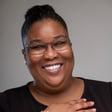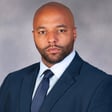The Role of a Conductor Metaphor
00:00:00
Speaker
Imagine a conductor of an orchestra. I'm standing at the podium with my little baton stick, whatever you want to call it.
00:00:08
Speaker
And I have headphones on over my head. Above it, you can see little musical notes to denote that I'm listening to music. But instead of an orchestra, there's different things I'm directing. A musical brainstorming section to my left. In the middle, a band. On the side, songwriters. So you see them next to a mic singing something.
00:00:31
Speaker
you know, over to the other side, you see, I don't know, budget calculations. And so me with my baton and the conductor is basically creating a symphony with the orchestra of the different places, the labels, the bands, the creative teams to make a beautiful music.
Introduction to 'Take Your Homeboy to Work Day'
00:00:52
Speaker
What's up world? Have you ever wondered, what does my friend actually do at work?
00:00:59
Speaker
If so, welcome to Take Your Homeboy to Work Day podcast. I am your host, BA, and here's what you can expect by tuning in. Each episode I interview guests from different professions and dive into exactly what they do and how they came to be in their roles. I'll also have them open up about how they find fulfillment through their work. So for anyone interested in hearing the firsthand experience of a specific career, these conversations are your launching pad.
Responsibilities of a Music Coordinator
00:01:30
Speaker
This episode, we'll learn about the life of a music coordinator in film and television. And a music coordinator's responsibility is to find music that can be used in a video or production. So for example,
00:01:46
Speaker
If a director wishes to hire an orchestra to record music for a film, it is up to that music coordinator to book the orchestra, the recording studio, the staff to support the studio, and they also must negotiate legal rights to the use of the music, the salaries of everybody involved, and coordinate with editors and film producers.
00:02:10
Speaker
And so as you can imagine, this role requires project management, negotiation, and finely tuned budgeting skills.
Interview with Tanisha Edwards
00:02:18
Speaker
Today's guest is Tanisha Edwards, music and production coordinator for Saatchi and Saatchi. I've always known Tanisha as a music head, so I was excited to invite her as a guest so I could hear how she leverages her creative and strategic brain in the world of music and Hollywood.
00:02:38
Speaker
Her path into this career is a bit non-traditional, but a rich lesson about ingenuity and intention. Her story is an inspiration, so pull up a chair. Welcome to the show, Tanisha. Thank you so much for having me, Brandon.
00:02:54
Speaker
Awesome. Yes, I knew I wanted to get you on now that you've gone down this career path. So thank you so much for pulling the curtain back on what it's like in music from this side that you see it. So thank you for coming on. And I guess I gave a brief introduction of what I think a music coordinator does, but could you explain in your own terms what it is a music coordinator is and does?
00:03:23
Speaker
Absolutely. Essentially the career path that I'm exploring is music supervision. I work as a music coordinator who supports the music supervisor. So essentially I work in music and media. That can include TV, movies, marketing trailers, video games. Currently I work for Sachi and Sachi and I work in advertising, essentially commercials.
00:03:51
Speaker
Gotcha, gotcha, gotcha. That work can involve curating, placing, clearing music, working with producers and composers to create something new. So any type of music, whether it's original or licensed, it's curating, placing, and clearing that on various mediums. Sounds exciting. How did you even hear about this?
Journey into Music Supervision
00:04:21
Speaker
It wasn't a hear about it thing, it was a curiosity thing. If people don't know, there are a million jobs in the music industry, ones that you would not expect. This particular career field came upon because
00:04:39
Speaker
I grew up in the 90s and we had movies with dope soundtracks and TV shows that showcased bands and artists that you've never seen before or you may have seen before. And one day I for the life of me cannot remember what I was watching.
00:04:57
Speaker
It might have been Empire Records, I don't know, but I was like, who does this? Is this a job? Play music in movies. So I went to Google and it was like, is this a job? And it popped up music supervisor. I was like, oh, put a pin in that. I want to say that happened around like,
00:05:21
Speaker
high school, maybe college. And I kind of just put it in my pocket and moved on with my goals of what I was already working through. So that's how I found it. I actually Googled it.
00:05:31
Speaker
Interesting, very interesting. Okay, okay, okay, okay. And I guess, so you put a pin in it. Clearly you wanted to circle back to it at some point.
Networking in the Music Industry
00:05:44
Speaker
So you put a pin in this in high school, you went to college. Is there a class that stands out from FAM that you think helped you the most, helped prepare you the most for this opportunity? Ooh.
00:06:01
Speaker
I can't say that it's one class but several lessons learned in business school in general. Music industry is very much so not what you know who you know like there is no other way to say it and one of the things that we were taught was
00:06:26
Speaker
how to network, how to get in with the right people, how to utilize your network. And that is extremely important in this role because you're working with a lot of different personalities. Unfortunately, there's a little bit of gatekeeping, actually more than a little bit. And so people have to basically pull you in versus you force your way in.
00:06:50
Speaker
So I'd say that business school as a whole, teaching us how to be in the rooms that we need to be in, or at least have people speak on you in the rooms you're not in, helped me the most. But I will say that I took an African-American film class and that course, although it spoke more to the film medium,
00:07:16
Speaker
It's kind of hard sometimes when you think about the entertainment industry because it's so vast. So it's like, do I do TV or movies? Do I do music? I'm absolutely a music head, but the intertwining of music and media is so necessary that it pulls me in both directions. So I'd say business school in general and then the African-American film course.
00:07:40
Speaker
Naturally, naturally. Okay, so you mentioned that it is a very gate-kept type of career opportunity. How were you able to get your foot in the door?
Networking During the Pandemic
00:07:57
Speaker
Well, hustling homie.
00:08:05
Speaker
You know, we just, you know, we're in the midst of a pandemic and I realized that I was wasting my gifts, my talents doing what I was doing. Yeah, I was good at it and I made really good money, but that ain't what I wanted to do. And so at the top of 2021, I, you know,
00:08:22
Speaker
talk to myself and was like, girl, let's go. So I essentially reached out to people in the career field I was interested in, honestly, to learn more because there's not a lot written. You don't run into people who are music supervisors. So you have to get the full one, one from them directly. And
00:08:43
Speaker
I was reaching out to them cold on LinkedIn. Prior to that, I was just attending any virtual panel I could attend. That's the one thing the pandemic did. It shrunk the world. So all of the things that I would have had to either be in New York or LA for was online. So I can attend these panels that I wasn't able to attend.
00:09:06
Speaker
and I would reach out to panelists to get not only their perspective on the role, but learn how I could take the skills I already have and apply them when trying to get in these roles. So the very first music supervisor that I reached out to
00:09:23
Speaker
actually reached back out to me and was like, yes, we can definitely sit down and talk. And it became this big web where after every conversation I had with a music supervisor that I met, whether it was a cold email or not,
00:09:39
Speaker
They introduced me to another, and they introduced me to another, and so on and so forth. And it became this big network of people I could reach out to for opinions, for suggestions, for connections. And it's with those connections that people started to basically advocate for me. I had somebody at one point who was passing out my resume like Skittles.
00:10:03
Speaker
I was getting interviews that I didn't even apply for because she was like, I admire your hustle. You need to be here. So when I mentioned that somebody has to pull you in, they pulled me in. Wow. Well, salute to you for being creative and finding out a way to separate yourself from the herd and using technology and using LinkedIn as a resource. So salute to you for building those bonds during a tough time. Thanks. Yeah.
00:10:31
Speaker
God, I was absolutely humbling. Oh, yeah? Why do you say that? I'm not the biggest on networking. I actually hate it. Well, backup hated it because it felt very transactional and
00:10:49
Speaker
This was the first time when you're reaching out to someone to get something you really want for me. I don't ask for help. I figure I could do it myself. And this was the first time actually seeing when people said, all you have to do is ask. And it worked. And I was like, Oh, okay. Nevermind. It works. Well, lesson learned, I guess.
The Impact of Music in Advertising
00:11:15
Speaker
So I wanted to actually come at your job and look at it with a business lens for these next two questions. So the first question I want to ask is about, in business, we're always talking about return on investment and you make a financial investment into something and then you're expecting a certain amount of return and value
00:11:42
Speaker
That could be dollar amount or that could be other qualitative ways that maybe can't be measured by money. But as it relates to your job as a music coordinator working on the path to music supervisor, what do you think is the return that your agency gets for the work that you do? Or if you're able to quantify that, that'd be great or not. And there's other ways that
00:12:07
Speaker
You know, they can, you know, they justify hiring you and all of that. I guess, how do you make value for the company you work for? Absolutely. So as you stated, I work for an ad agency. So essentially we provide marketing service for our clients.
00:12:22
Speaker
client tells us what their goals are, what their scope is for the year. And we, from their work, whether it's through social media, commercials, radio ads, whatever, we work to bring either brand awareness, if that's the goal, sales awareness,
00:12:41
Speaker
Or just to say, hey, remember us, we're here. And a part of every single piece of that involves music. The client has learned that music, whether it's a familiar song that you've known all your life or something that drives a spot and makes it cool, has to happen for people to identify with it. So my job
00:13:03
Speaker
tells the viewer how to feel, hey, buy our car or hey, this is our brand and this is what we're about. For example, we recently did a campaign for the brand itself and it was a tender, loving spot that if you watch it without music, I mean, it was cute, but it didn't tell you how to feel.
00:13:29
Speaker
So as I worked with composers, it was make it tender, make it tear joking, make them cry. And people were crying at the end of the commercial because we told them how to feel. And it in turn gives the brand itself some humanity. So that helps in bringing brand awareness. In turn, I want to buy a car now because you, you know,
00:13:54
Speaker
listen to us or you make me feel human and the feelings that I feel are identified through this company. So that's how we do it is basically marketing either what we want you to feel or what we want you to buy. Right. And, you know, as you were saying that, you know, in a way the music is probably maybe even the most important part of an ad. I mean, that's what really hooks you and grabs you. So I would imagine this is even the most part more important than the visual, I bet, even. Probably, um,
00:14:23
Speaker
So many times, I do not know if I'm watching an ad, I have no idea what you're trying to sell me. But I probably remember the song that was playing in the background. Right.
00:14:36
Speaker
Okay, okay. So now it's coming together as far as what you do. Like you just explained it, but for music and an advertisement, you would be the person who selects the song or handles the back-end work, the hard, the tough back-end work to get everything finalized. It is coming together, what you do and how you contribute. So that's awesome to hear.
00:15:01
Speaker
A question for people who were interested in going down this path is you.
Salary Insights for Music Coordinators
00:15:06
Speaker
I'd love for the audience just to know realistically how much they can make. So is there a range that you could share for what a music coordinator makes?
00:15:16
Speaker
So that ultimately depends on the kind of company that you decide to go with because there's essentially two sides. There's the people that place the music on the spot and movie, whatever. And then there's the other side. Someone has to pitch it to you. So there are people who work for record labels, music companies, all of that at the lower level, which is either an assistant or a coordinator role. It could be either depending on the tasks, um,
00:15:44
Speaker
kind of drives how much people make. For example, if you were to be a music coordinator at say like a Warner media, or what do they call it now? Warner Brothers Discovery plus three plus nine. You were going to make money because they're a large one. Hey, I don't know what they're doing over there. But if you were to work for them, they're a large corporation.
00:16:11
Speaker
with multiple departments, divisions and all of that. So you're gonna make on the higher end. If you're working for say an independent music supervisor, it's gonna be on the low end. And I tend to try to stay with a large corporation with benefits. So take what you can from that. But the salary ranges, depending on how big the company is, can typically range from the low 30s to the low 50s, depending on who you start with. Okay.
00:16:39
Speaker
Awesome. Well, I know money can sometimes be a sensitive topic, but I appreciate you being transparent and open. It's really for the benefit of learning. So thank you for sharing that. Oh, absolutely. I mean, essentially I started a career over from scratch. Yeah. So those are things that people need to know. Hey, it's great that you want to join us, but you're not going to start mid-level like you are with your current job. Like it is, you have to start from the bottom. And so starting from the bottom requires starting a salary over from scratch.
Tanisha's Achievements
00:17:11
Speaker
And so I guess I'd love to jump into some of the work that you've actually been doing and I guess what you've been able to accomplish. So as you reflect over the work you have been doing, what has been your proudest achievement so far?
00:17:33
Speaker
It's hard to answer because I don't think I'm nearly even started. I'd have to say my first achievement would be to even get into the music industry. Like I said, it's very, it's very touchy. There are people who've been trying their whole lives who haven't gotten in. And so the fact that I could do it within a year's time is, you know, kind of dope. So that's the one. Thank you.
00:17:59
Speaker
I don't think I've gotten to my greatest achievement yet, not even close, but I do think that it was pretty dope to see my name in the credits of work I've done. Like the first time to see it was pretty dope to see. Yeah. Yeah. Do you remember what your contributions were on that specific project?
00:18:21
Speaker
Oh no, not at all. I hate them so much. It's one of those things where you just started and you're kind of just executing what you can. Now I can run it down, but then it was like you're trying not to spin out of control because what am I doing? I know the mind from you coming from now, so totally understood.
00:18:43
Speaker
So, well, let me ask you this, before you came into the role, I imagine you had expectations of what you would be doing, but what's been the most shocking experience you've had so far, though, the one thing that was unpredictable that you couldn't have imagined you would have experienced?
Managing Creative Personalities
00:19:02
Speaker
I probably would have had an answer for this, a different answer for this about six months ago, but today I have to say the amount of work it takes to corral creatives. Music supervisors do not
00:19:20
Speaker
do this work in a silo. There are several other people that are involved, whether it's the production company, the director, everybody has their own vision for what you're looking at sounds like or should sound like. And so there are several levels of having to deal with the different personalities to get it to fruition. You may think this is the stupidest thing I've ever heard in my life, but this ain't my show, so let me do it. And then having to like tell people that's a bad idea,
00:19:48
Speaker
in the best way possible. And so having to corral those different personalities is like having a bunch of toddlers hyped up on pixie sticks.
00:20:07
Speaker
I can imagine do they give you special training to handle that act because I imagine you're also navigating egos and people putting their heart into their music. Do they give you training for how to handle these sensitive topics with certain people?
00:20:26
Speaker
Nah, they toss you in the water and hope you swim. You also gotta remember that you're, I mean, like Erykah Badu said, artists are sensitive about their stuff. And there's no, you know, like I said, they see their picture in a certain way. Or for example, if I'm using a licensed track, say I picked something from Elton John and they want it on a, you know, on their spot.
00:20:54
Speaker
Elton ain't gonna let anybody have his stuff. There has to be creative approval. Like some people are like, oh, like I've actually had, um, there was a song they wanted on an ad for, I think it was like a tundra and the car is like zipping through, I don't know, grass, no, like different elements.
00:21:13
Speaker
and got to the artist approval and they were like, I don't like the way that truck is ripping through the environment and tearing up the grass. I will not approve this. Like some people are very sensitive about associating their art.
00:21:26
Speaker
with certain picture. So yes, like trying to approach people like you have a feral cat. Hey, can I have this song? Because it's their work. It's their art and they don't want it any old place. So yeah, definitely dealing with the different personalities of creatives is
00:21:49
Speaker
You just got to work your way through it and figure out the best, like you have to have creative solutions. You have to figure out how to, okay, I can't give them this, but what can I give them? Type of thing. So you just have to figure it out. Awesome. Awesome. And, um, I actually wanted to maybe
Transferable Skills in Music Career
00:22:10
Speaker
ask a backup question because you alluded to this earlier, how this is like your second life, your second career, because you weren't doing other work previously, but you do still feel that that previous work gave you a foundation to be successful in this current role. And you even mentioned that some of your early mentors helped you translate what you previously did into showing that you could do this role. So from your previous life, the work you did, what skills
00:22:40
Speaker
were you able to bring and transfer to this new career that you just started? Yeah, absolutely. I didn't start this job fresh out of college with no professional work experience. Prior to working as a music coordinator, I worked for the DOD as a contract admin and a price cost analyst. So sitting down with what the
00:23:04
Speaker
needs are for a music coordinator or supervisor and what I have, you can see there's some overlap. So some of the places where my skills transfer were things like negotiation. You have to negotiate with labels and composers and things to make sure you stay on budget. You basically have to negotiate with creatives so they don't jump out of a window.
00:23:26
Speaker
You know, one of the big things is, is you don't bust your budget. If they say you got $10, once you need to give me 10 songs for that $10, somehow you need to find a dollar per song. I don't know how you're going to do it, but you need to figure it out. So, you know, lots of spreadsheets, lots of numbers, but nothing like calculus or anything.
00:23:47
Speaker
And then also like dealing with the different personalities, whether it's a director or a creative, a music label or whatever, you have to know how to maneuver through these because your relationships drive your career. You're not going to get anywhere and people don't like you because anybody gonna hire you. So those are things that transfer over and
00:24:11
Speaker
You know, every job needs this, interpersonal skills. Every job needs working well with others. Every job needs, you know, you can work in a group setting, things of that nature. So when I came in, the experiences that I had assisted, I learned everything I needed to know in the job, but those other things assisted. And it kind of kept me a step above because when applying to these jobs, I mean, think about it.
00:24:36
Speaker
Competing against 20-year-olds. And to be honest, it wasn't hard. Because they don't have. It was not. They don't have. They don't polish at all. It seems like it's getting worse.
00:24:55
Speaker
But it wasn't hard to stand out in comparison to them. I didn't go to music school. I don't have a musical background. I don't play an instrument. I don't sing. That's a lie. I sing all the time. But I don't have those typical things of people that join this industry, whether it's being a DJ or anything like that. I seriously was walking in cold. But because I have those years of work experience behind me, I separated from them rather easily.
00:25:22
Speaker
Thank you for listening to Take Your Homeboy to Work Day podcast. This concludes part one. Check back in on Friday for part two. But before you go, we need your help to spread our message. So please subscribe, like, and rate five stars wherever you get your podcast and on LinkedIn at Take Your Homeboy to Work Day podcast. Thank you.














